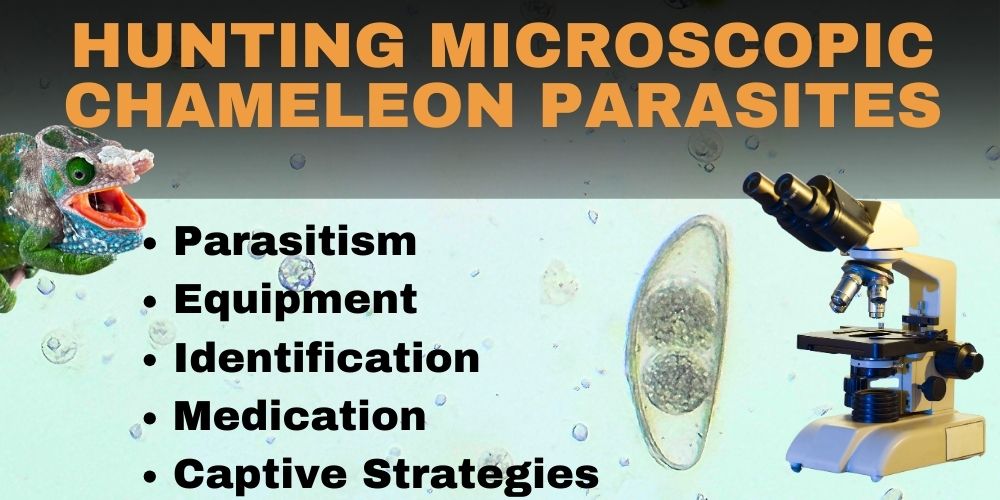This course gives you what you need to know to understand the parasite lifecycle, how they interact with chameleons, and how to treat them. It prepares you to be a fully engaged partner with your veterinarian in keeping your chameleon at top health!
What Is Hunting Microscopic Chameleon Parasites?
Hunting Microscopic Chameleon Parasites is a new educational approach called Community Powered Courses which combines the freedom of an asynchronous course (which means you can access it at any time and progress at your own speed) and having a classroom atmosphere. This course is being held on the Chameleon Academy Virtual Campus which is a digital campus created specifically for chameleon enthusiasts to study and learn. You will be able to take your class and then come to a discussion areas with your fellow students and alumni of the course. You can ask questions on each one of the lessons and take part in the advanced discussions that the graduates are having. We post case studies in the group and have regular live guest speakers in the Lecture Hall.
Our goal is for you to learn the material not only in the academic sense, but with practical discussions about real experiences. And upon completion of the course, I would hope you would choose to stay in the discussion and enrich the experiences of the new students that join in.
The course itself is over two hours of video instruction on the subject of chameleon parasites and how we should deal with them as chameleon herpetoculturists.
What You Will Learn In This Course
By the end of this course you will have learned the following
- The basics of parasitology
- The relationship between chameleons and parasites
- What to look for in purchasing a microscope
- What other equipment is necessary
- How to identify parasites
- Understanding the medications commonly available and their characteristics.
- How to manage a quarantine situation
- How to work with your veterinarian to keep your chameleon in top health.
Here is a sample of the parasites you'll meet!
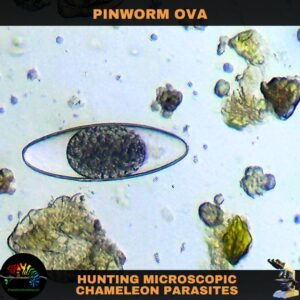
This is the egg of a pinworm taken from a direct fecal smear test. Finding this ova in your chameleon means it is time to request Fenbendazole from your veterinarian! In this course you will learn to identify that you have a nematode infection by both direct fecal smear and fecal floatation tests.
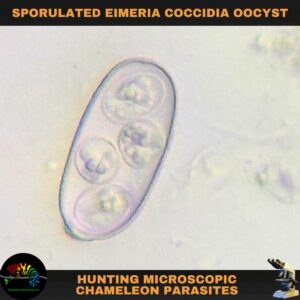
Coccidia strikes fear in any chameleon keeper’s heart. When you find coccidia in your chameleon it is time to act. Through this course you will learn the medications that affect coccidia and quarantine procedures to help beat the infection.
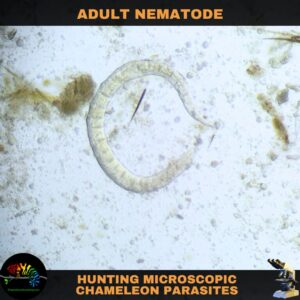
With most species of nematodes we see the eggs in the fecal matter, but there are a few species, such as Strongyloides, that come out as adults as well. You will learn how to purchase and use a microscope so you can see these worms slithering across your microscope slide.
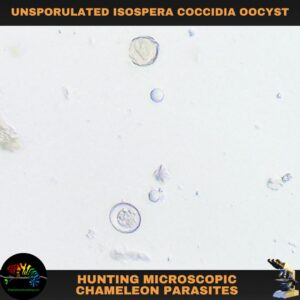
What is significant about this picture? It shows an unsporulated Isospera coccidia. In this class you will learn about the lifecycles of the parasites. They aren’t always infectious! But knowing when they are dangerous allows you to strategically break their lifecycle! A coccidia does not come out immediately infectious. It needs to “sporulate”, which is a development stage. Once that center mass separates it has “sporulated” and would then be infectious.
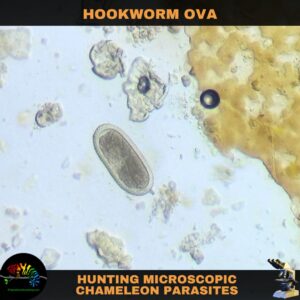
There are many types of nematode worms that can infect your chameleon. This ova pictured is from a hookworm. Luckily, we do not have to be able to identify nematodes to the species level as they are all treated with the same medications. Identifying them to the species level is for those of us who just love to do this!
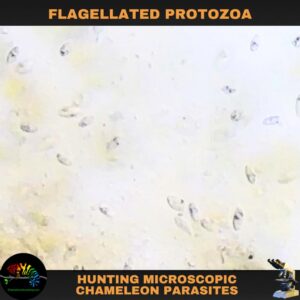
Flagellated protozoa don’t look like much on a still image. It is when you see them in real time you see the frenetic movement as your microscope slide comes alive! These are, unfortunately, common chameleon parasites so they are often seen.
What Is The Cost?
The cost for the course is a one time $80 which gives you access to the course for the life of the course, including any future updates. You will get access to a closed community forum that is for students of Chameleon Academy courses or other special projects. Though continued access to the community common areas is dependant on adhering to a code of conduct. The community is specifically for those involved with Chameleon Academy courses and projects and is intended to be for study, learning, and relaxing. Please help maintain this atmosphere.
This course and community is build on a professional platform which is web-based, but also has a free iphone/android app where you can access your classes and community.
To join the course and community tap the buy button below. This will take you to a purchase page. There you will be asked to enter in an email and password which will serve as your virtual campus login. If you are already a member of a Circle.co community then you can sign-up using those login in credentials as well. Once you have completed the sign in you will gain immediate access to the course and the course community. Please make a profile and introduce yourself!

